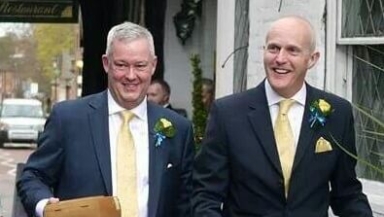A gay clergyman has lost his claim he was discriminated against when his licence to practise was removed after he married his gay partner.
Canon Jeremy Pemberton appealed an earlier court ruling arguing the Church of England's ban on ministers in same-sex marriages breached equality laws. Employment tribunal judge Jennifer Eady ruled the state could not impose gay partnerships on the church.

In a statement after Wednesday's decision, Pemberton said the decision was "obviously not the one my husband and I had hoped for".
He said: "I appreciate that this case was a source of hope for many people and I am grateful that the judge has recognised its significance and indicated that its importance warrants permission to appeal to the court of appeal.
"I am now going to take some time to consider the lengthy judgment with my husband, and we will decide on the best way forward, having taken advice from my lawyers."
He added the ruling had made it possible to take the case to the Court of Appeal.
Pemberton married his partner, Laurence Cunnington, in April 2014 in defiance of Church teaching.
Then Bishop of Southwell and Nottingham, Richard Inwood, revoked Pemberton's permission to officiate which blocked him from taking up a role as hospital chaplain, even though he would be employed by the NHS.
Pemberton bought the case against Inwood and it was seen as a test for the Church's teaching in the light of the Equality Act 2010.
A spokesperson for the diocese of Southwell and Nottingham said: "Churches across the diocese continue to offer a generous welcome to people from all backgrounds and we remain fully engaged in the church's exploration of questions relating to human sexuality.
"The Church of England supports gay men and women who serve as clergy in its parishes, dioceses and institutions. It has no truck with homophobia and supports clergy who are in civil partnerships, as set out in the house of bishops' guidelines in 2006."













